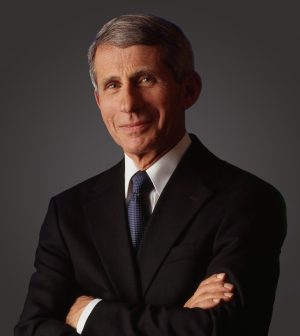- Could Your Grocery Store Meat Be Causing Recurring UTIs?
- Are You Making This Expensive Thermostat Error This Winter?
- Recognizing the Signs of Hypothyroidism
- 10 Strategies to Overcome Insomnia
- Could Artificial Sweeteners Be Aging the Brain Faster?
- Techniques for Soothing Your Nervous System
- Does the Water in Your House Smell Funny? Here’s Why
- Can a Daily Dose of Apple Cider Vinegar Actually Aid Weight Loss?
- 6 Health Beverages That Can Actually Spike Your Blood Sugar
- Treatment Options for Social Anxiety Disorder
Dr. Anthony Fauci Recovering at Home After Being Hospitalized With West Nile Virus

Dr. Anthony Fauci, who helped millions of Americans navigate the health challenges of the pandemic, is recovering at home after being hospitalized for a West Nile infection.
Fauci should make a full recovery, a spokesperson told the Associated Press on the condition of anonymity due to security concerns.
In a post on the social media platform X, Dr. Jonathan LaPook, chief medical correspondent for CBS News, said he spoke Saturday with Fauci, who believes he was likely infected from a mosquito bite that he got in his backyard.
“Dr. Fauci was hospitalized about ten days ago after developing fever, chills and severe fatigue,” the post said, adding that Fauci spent a week in the hospital.
There are no vaccines or medications for West Nile infection. As of Aug. 20, the U.S. Centers for Disease Control and Prevention had recorded 216 cases in 33 states this year.
West Nile virus is commonly spread through the bite of an infected mosquito. While most people don’t experience symptoms, about 1 in 5 can develop a fever, headache, body aches, vomiting, diarrhea or rash, according to the CDC. Roughly 1 in 150 patients can develop a serious, sometimes fatal, illness.
Fauci first joined the U.S. National Institutes of Health in 1968 and rose to prominence within the agency during the 1980s AIDS crisis. As an HIV/AIDS researcher, Fauci conducted pivotal studies that formed the basis of medicine’s current understanding of the disease and continue to inform the therapies used to treat and prevent AIDS.
Fauci became NIAID director in 1984, and advised every U.S. president on infectious disease emergencies from Ronald Reagan onward.
During the pandemic, Fauci was the public face of the U.S. government, serving as chief medical advisor to the White House. The role made him a hero to some and a villain to others.
He stepped down from that role in 2022, but joined the faculty at Georgetown University last summer as a distinguished professor.
More information
The CDC has more on West Nile virus.
SOURCE: Associated Press
Source: HealthDay
Copyright © 2026 HealthDay. All rights reserved.










